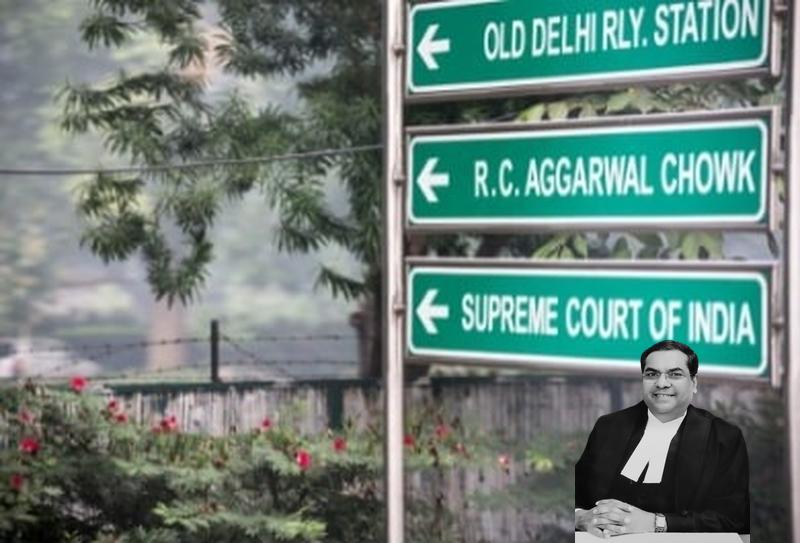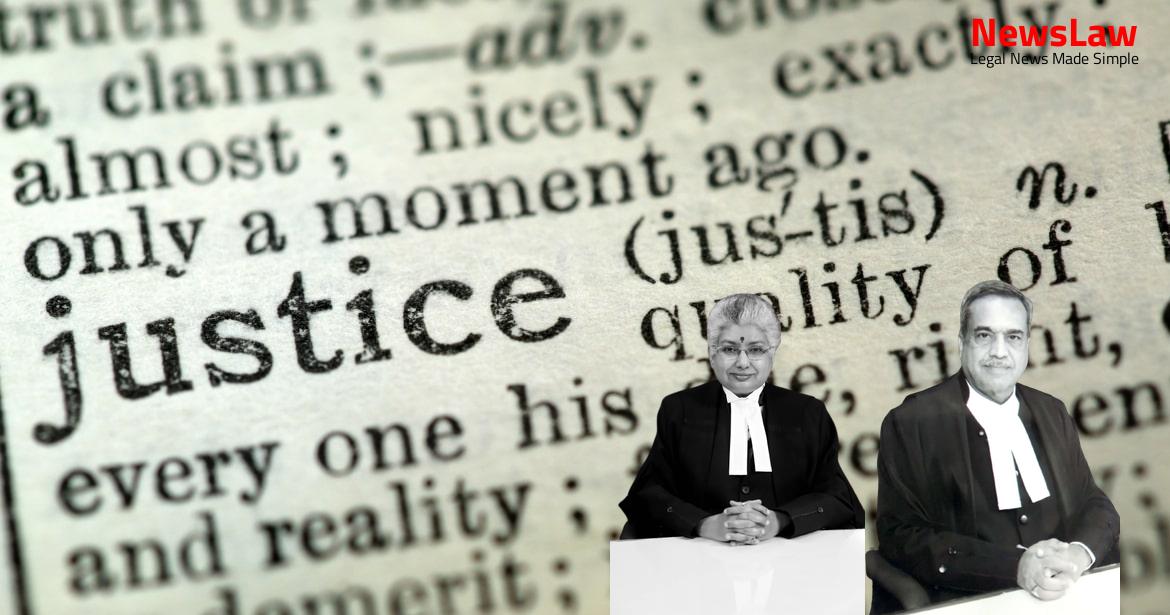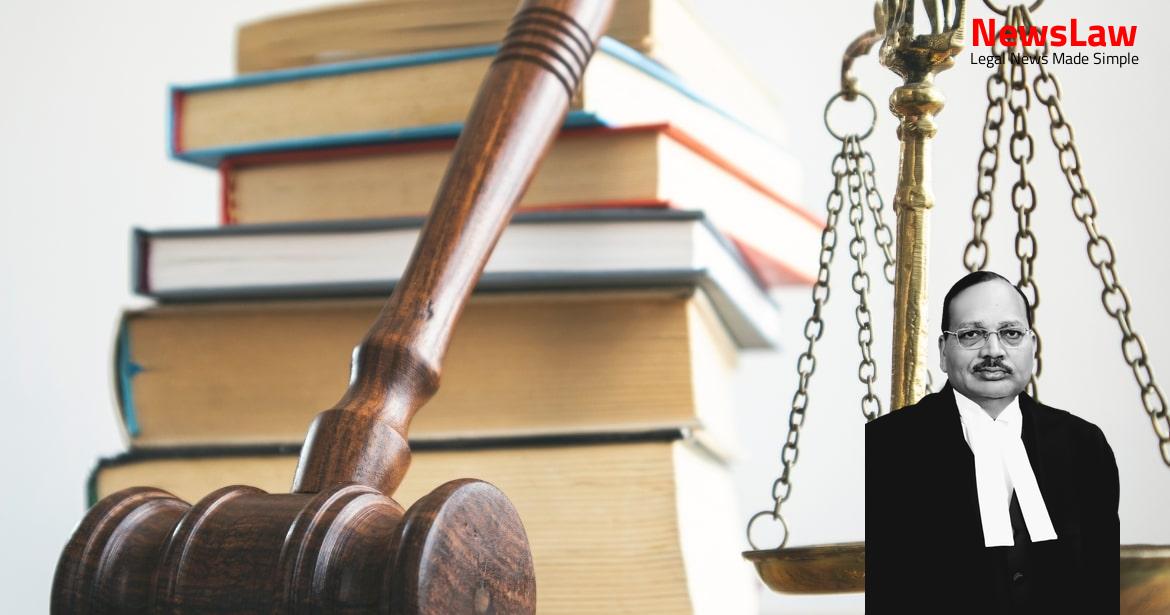The Company, during the period 1994-2000, was granted and availed of financial assistance from the appellant – IDBI. However, as the goods were not cleared for home consumption in terms of Section 47 of the Customs Act, even after expiry of the extended period of warehousing, show-cause notices were issued, and after considering the explanation given by the Company, orders-in- original dated 15 September 2000 and 10 October 2000 were passed confirming levy of customs duty of Rs.3,27,22,191/- and Rs.10,48,29,017/-, respectively. This application was allowed by a single judge of the High Court vide the order dated 3 September 2004 observing, inter alia, that the customs authorities had not followed the procedure contemplated under the Customs Act before passing the order under Section 72 of the Customs Act, in the absence of which the detention orders were void ab initio and non-est in the eyes of law. Consequently, as the winding up order had been passed against the Company but sale was yet to be effected, the Official Liquidator was duty bound to take into his custody and control all properties, effects and actionable claims, including the movable property, that is, the imported goods. The full bench of the Andhra Pradesh High Court has held that Section 468 of the Companies Act has no application as it empowers the Company Court to require the ‘contributory’ to pay, deliver, surrender or transfer any money, property or books and papers in his custody or control. Thereafter, vide order dated 5 October 2017, the customs authorities, along with the appellant – IDBI and the Official Liquidator, were permitted to sell the goods subject to deposit of the auction sale proceeds with the Registry of this Court.
Preferential payments.— (1) In a winding up, subject to the provisions of Section 529-A, there shall be paid in priority to all other debts— (a) all revenues, taxes, cesses and rates due from the company to the Central or a State Government or to a local authority at the relevant date as defined in clause (c) of sub-section (8) and having become due and payable within the twelve months next before that date; (b) all wages or salary (including wages payable for time or piece work and salary earned wholly or in part by way of commission) of any employee, in respect of services rendered to the company and due for a period not exceeding four months within the twelve months next before the relevant date, subject to the limit specified in sub-section (2); (c) all accrued holiday remuneration becoming payable to any employee, or in the case of his death to any other person in his right, on the termination of his employment before or by the effect of, the winding up order or resolution; (d) unless the company is being wound up voluntarily merely for the purposes of reconstruction or of amalgamation with another company, all amounts due, in respect of contributions payable during the twelve months next before (4) Where any payment has been made to any employee of a company,— (i) on account of wages or salary; or (ii) to him, or in the case of his death, to any other person in his right on account of accrued holiday remuneration, out of money advance by some person for that purpose, the person by whom the money was advanced shall, in a winding up, have a right of priority in respect of the money so advanced and paid, up to the amount by which the sum in respect of which the employee or other person in his right, would have been entitled to priority in the winding up has been diminished by reason of the payment having been made. (6) Subject to the retention of such sums as may be necessary for the costs and expenses of the winding up, the foregoing debts shall be discharged forthwith so far as the assets are sufficient to meet them, and in the case of the debts to which priority is given by clause (d) of sub-section (1), formal proof thereof shall not be required except in so far as may be otherwise prescribed. (8) For the purposes of this section— (a) any remuneration in respect of a period of holiday or of absence from work through sickness or other good cause shall be deemed to be wages in respect of services rendered to the company during that period; (b) the expression “accrued holiday remuneration” includes, in relation to any person, all sums which by virtue either of his contract of employment or of any enactment (including any order made or direction given under any enactment), are payable on account of the remuneration which would, in the ordinary course, have become payable to him in respect of a period of holiday, had his employment with the company continued until he became entitled to be allowed the holiday; (bb) the expression “employee” does not include a workman; and (c) the expression “the relevant date” means— (i) in the case of a company ordered to be wound up compulsorily, the date of the appointment (or first appointment) of a provisional liquidator, or if no such appointment was made, the date of the winding up order, unless in either case the company had commenced to be wound up voluntarily before that date; and (ii) in any case where sub-clause
Therefore, when there is a clash and disagreement between section 529A of the Companies Act and another provision of the Companies Act or any other enactment in force on 24 May 1985, Section 529A prevails and the debts are to be paid in terms of Section 529A of the Companies Act. As per clause (b) of sub-Section (1) to Section 529A of the Companies Act, the debts due to secured creditors to the extent such debts under clause (c) of the proviso to sub-Section (1) to Section 529 rank pari passu with the workmen’s dues, are to be paid in priority to all other debts. Clause (a) to Section 530(1) of the Companies Act confers preferential status to all revenue taxes, cesses, and rates ‘due’ to the Central or the State government or to a local authority on the ‘relevant date’ as defined in clause (c) to sub-section (8) to Section 530 of the Companies Act, which have become ‘due and payable’ within the twelve months next before the relevant date. We shall subsequently interpret the expression debts ‘due’ in the first portion of clause (a) to Section 530(1) of the Companies Act and the words ‘become due and payable within the twelve months next before that date’ in the latter portion of clause (a) to Section 530(1) of the Companies Act, but at this stage, it is relevant to take on record the ‘relevant date’ as defined in clause (c) to sub- Section (8) to Section 530 of the Companies Act. Custody of company’s property— (1) Where a winding up order has been made or where a provisional liquidator has been appointed the liquidator or the provisional liquidator, as the case may be, shall take into his custody or under his control, all the property, effects and actionable claims to which the company is or appears to be entitled. (1-B)
Also Read: https://newslaw.in/supreme-court/appellants-obligation-under-mineral-auction-rules/
For the purpose of securing compliance with the provisions of sub-section (1-A), the Chief Presidency Magistrate or the District Magistrate may take or cause to be taken such steps and use or cause to be used such force as may in his opinion be necessary.” — The Tribunal may, at any time after making a winding up order, require any contributory for the time being on the list of contributories, and any trustee, receiver, banker, agent, officer or other employee of the company, to pay, deliver, surrender or transfer forthwith, or within such time as the Tribunal directs, to the liquidator, any money, property or books and papers in his custody or under his control to which the company is prima facie entitled.” “ 528. — (1) In the winding up of an insolvent company, the same rules shall prevail and be observed with regard to— (a) debts provable; (b) the valuation of annuities and future and contingent liabilities; and (c) the respective rights of secured and unsecured creditors; as are in force for the time being under the law of insolvency with respect to the estates of persons adjudged insolvent: Provided that the security of every secured creditor shall be deemed to be subject to a pari passu charge in favour of the workmen to the extent of the workmen’s portion therein, and where a secured creditor, instead of relinquishing his security and proving his debt, opts to realise his security,— (a) the liquidator shall be entitled to represent the workmen and enforce such charge; (b) any amount realised by the liquidator by way of enforcement of such charge shall be applied rateably for the discharge of workmen’s dues; and (c) so much of the debt due to such secured creditor as could not be realised by him by virtue of the foregoing provisions of this proviso or the amount of the workmen’s portion in his security, whichever is less, shall rank pari passu Explanation.—For the purposes of this proviso, the portion of expenses incurred by the liquidator for the preservation of a security which the secured creditor shall be liable to pay shall be the whole of the expenses less an amount which bears to such expenses the same proportion as the workmen’s portion in relation to the security bears to the value of the security.
(3) For the purposes of this section, Section 529-A and Section 530,— (a) “workmen”, in relation to a company, means the employees of the company, being workmen within the meaning of the Industrial Disputes Act, 1947; (b) “workmen’s dues”, in relation to a company, means the aggregate of the following sums due from the company to its workmen, namely:— (i) all wages or salary including wages payable for time or piece work and salary earned wholly or in part by way of commission of any workman, in respect of services rendered to the company and any compensation payable to any workman under any of the provisions of the Industrial Disputes Act, 1947; (ii) all accrued holiday remuneration becoming payable to any workman, or in the case of his death to any other person in his right, on the termination of his employment before, or by the effect of, the winding up order or resolution; (iii) unless the company is being wound up voluntarily merely for the purposes of reconstruction or of amalgamation with another company, or unless the company has, at the commencement of the winding up, under such a contract with insurers as is mentioned in Section 14 of Sub-section (1A) to Section 456 of the Companies Act entitles the liquidator or the provisional liquidator to write a request to the Chief Presidency Magistrate or the District Magistrate within whose jurisdiction such property, effects or actionable claims etc. Section 528 of the Companies Act states that debts of all descriptions, including the debts payable on contingency, and claims against the company, present or future, ascertained or sounding only in damages, shall be admissible to proof against the company, on a just estimate being made of such debts as far as possible. Accordingly, and with this objective, Section 529A of the Companies Act refers to the doctrine of pari passu in the proviso to sub-section (1) to Section 529, with reference to the claims inter se the workmen and the secured creditors. Thereafter, the creditors are paid out by the liquidator from the sale proceeds of the assets of the liquidated company. The creditors have to be paid in terms of the waterfall or priority mechanism. This objective and intent is also apparent when we examine the Company Court Rules, as per which the liquidator is to fix a date on or before which all creditors of the company are to prove their debts or claims and to establish any title they may have to priority under Section 530 of the Companies Act. The interpretation is no longer debatable in view of the judgment of this Court in Rajratha Naranbhai Mills Co. in Sales Tax Officer, Petlad (supra), overruled the judgment of the division bench under challenge, for several reasons, to hold that the words debt ‘due’ occurring in the first part and the words debt ‘due and payable’ in the latter part of Section 530(1)(a) of the Companies Act are different expressions meant to convey different and not the same meaning. Therefore, for a government debt to be covered under clause (a) to Section 530(1) of the Companies Act, it must not only be a debt ‘due’, but it must also be a debt ‘due and payable’ within twelve months next before the relevant date.
1988) it has been noticed at page 1320 that Section 530 of the Companies Act, 1956 has been largely recast and amended in the light of the following recommendations (excerpted) of the Company Law Committee in paragraph 218 of their Report: xx xx xx
In this connection we should like to refer to a memorandum that we received from the Central Board of Revenue, on the question of a priority to be given to crown demands generally and, in particular, to arrears of income tax, super tax and corporation tax. We are aware of the large arrears of income and other taxes which are due by many companies, which are in liquidation, but we would venture to think that the remedy for this unsatisfactory situation is not the conferment of preferential rights without limit to the income tax authorities under Section 230 of the Indian Companies Act, but the energetic completion of assessment proceedings and vigorous measures for the collection of the assessed taxes. Both benches of the High Court, with due respect, gave to the provision a very wide and varied interpretation and that too on literality and grammaticals seemingly overlooking the legal philosophy which permeates the provision, the same being that the debts due and payable, so as to claim priority, must be appropriated to the period within 12 months next before the relevant date and their liability for payment must be founded during that period and no other. Desai, J., in his judgment in Sales Tax Officer, Petlad (supra) as a judge of Gujarat High Court, had examined the question of when a debt becomes payable, for this is a requirement to be satisfied, and only when the debt becomes ‘due and payable’ during the twelve months next before the relevant date, does the debt get the character of a preferential debt. In the context of the Sales Tax Act in question, it was held that the sales tax became ‘due and payable’ when the returns were filed. This Court in Dena Bank (supra), while examining the issue of priority of government dues or Crown debts over the dues of other creditors, opined that the Crown’s preferential right to recovery of debts over other creditors is confined to ordinary or unsecured creditors. At the same time, we must record for clarity that this principle, which vents from the ‘law in force’ within the meaning of Article 372(1) of the Constitution of India, must give way to a statutory charge which may be created by an enactment, whereby a first charge is given to government dues or Crown debts, notwithstanding the charge of the secured creditors. (1) The rate of duty and tariff valuation of imported goods.— (1) The rate of duty and tariff valuation, if any, applicable to any imported goods, shall be the rate and valuation in force,— (a) in the case of goods entered for home consumption under Section 46, on the date on which a bill of entry in respect of such goods is presented under that section; (b) in the case of goods cleared from a warehouse under Section 68, on the date on which a bill of entry for home consumption in respect of such goods is presented under that section; (c) in the case of any other goods, on the date of payment of duty: Provided that if a bill of entry has been presented before the date of entry inwards of the vessel or the arrival of the aircraft or the vehicle by which the goods are imported, the bill of entry shall be deemed to have been presented on the date of such entry inwards or the arrival, as the case may be. Entry of goods on importation.— (1) The importer of any goods, other than goods intended for transit or transhipment, shall make entry thereof by presenting electronically on the customs automated system to the proper officer a bill of entry for home consumption or warehousing in such form and manner as may be prescribed: Provided that the Principal Commissioner of Customs or Commissioner of Customs may, in cases where it is not feasible to make entry by presenting electronically on the customs automated system, allow an entry to be presented in any other manner:
Also Read: https://newslaw.in/?p=680
Provided further that if the importer makes and subscribes to a declaration before the proper officer, to the effect that he is unable for want of full information to furnish all the particulars of the goods required under this sub-section, the proper officer may, pending the production of such information, permit him, previous to the entry thereof : (a) to examine the goods in the presence of an officer of customs, or (b) to deposit the goods in a public warehouse appointed under Section 57 without warehousing the same. (3) The importer shall present the bill of entry under sub-section (1) before the end of the day (including holidays)
preceding the day on which the aircraft or vessel or vehicle carrying the goods arrives at a customs station at which such goods are to be cleared for home consumption or warehousing: Provided that the Board may, in such cases as it may deem fit, prescribe different time limits for presentation of the bill of entry, which shall not be later than the end of the day of such arrival: Provided further that] a bill of entry may be presented at any time not exceeding thirty days prior to the expected arrival of the aircraft or vessel or vehicle by which the goods have been shipped for importation into India: Provided also that where the bill of entry is not presented within the time so specified and the proper officer is satisfied that there was no sufficient cause for such delay, the importer shall pay such charges for late presentation of the bill of entry as may be prescribed. (4) The importer while presenting a bill of entry shall make and subscribe to a declaration as to the truth of the contents of such bill of entry and shall, in support of such declaration, produce to the proper officer the invoice, if any, and such other documents relating to the imported goods as may be prescribed.
Clearance of warehoused goods for home consumption.—
Any warehoused goods may be cleared from the warehouse for home consumption, if — (a) a bill of entry for home consumption in respect of such goods has been presented in the prescribed form; (b) the import duty, interest, fine and penalties payable in respect of such goods have been paid; and (c) an order for clearance of such goods for home consumption has been made by the proper officer: Provided that the order referred to in clause (c) may also be made electronically through the customs automated system on the basis of risk evaluation through appropriate selection criteria: Provided further that the owner of any warehoused goods may, at any time before an order for clearance of goods for home consumption has been made in respect of such goods, relinquish his title to the goods upon payment of penalties that may be payable in respect of the goods and upon such relinquishment, he shall not be liable to pay duty thereon: and, thereupon, show cause notices dated 17 February 2000 and 10 April 2000 were issued and two adjudication orders dated 15 September 2000 and 10 October 2000 were passed. The amount ‘due and payable’ in terms of the two adjudication orders dated 15 September 2000 and 10 October 2000 would, therefore, not fall in the category of preferential payments under clause (a) to Section 530(1) of the Companies Act. The provisions in the Customs Act do not, in any manner, negate or override the statutory preference in terms of Section 529A of the Companies Act, which treats the secured creditors and the workmen’s dues as overriding preferential creditors; and the government dues limited to debts ‘due and payable’ in the twelve months next before the relevant date, which are to be treated as preferential payments under Section 530 of the Companies Act, but are ranked below overriding preferential payments and have to be paid after the payment has been made in terms of Section 529 and 529A of the Companies Act. Liability under Act to be first charge. — Notwithstanding anything to the contrary contained in any Central Act or State Act, any amount of duty, penalty, interest or any other sum payable by an assessee or any other person under this Act, shall, save as otherwise provided in Section 529-A of the Companies Act, 1956 (1 of 1956), the Recovery of Debts Due to Banks and the Financial Institutions Act, 1993 (51 of 1993), the Securitisation and Reconstruction of Financial Assets and the Enforcement of Security Interest Act, 2002 and the Insolvency and Bankruptcy Code, 2016 be the first charge on the property of the assessee or the person, as the case may be.”
However, the enactment of section 142A of the Customs Act does confer or create a first charge on the dues ‘payable’ under the Customs Act, notwithstanding provisions under any Central Act, but not in cases covered under Section 529A of the Companies Act, RDDBFI Act, SARFAESI Act and the IBC. (supra) was referred to in Sundaresh Bhatt, Liquidator of ABG Shipyard (supra), wherein this Court observed that reliance of the National Company Law Appellate Tribunal on Dytron (India) Ltd.
Case Title: INDUSTRIAL DEV.BANK OF INDIA THROUGH STRESSED ASSETS STABILISATION FUND CONSTITUTED BY THE GOVT. OF Vs. SUPERINTENDENT OF CENTRAL EXCISE AND CUSTOMS (2023INSC746)
Case Number: C.A. No.-002568-002568 / 2013



